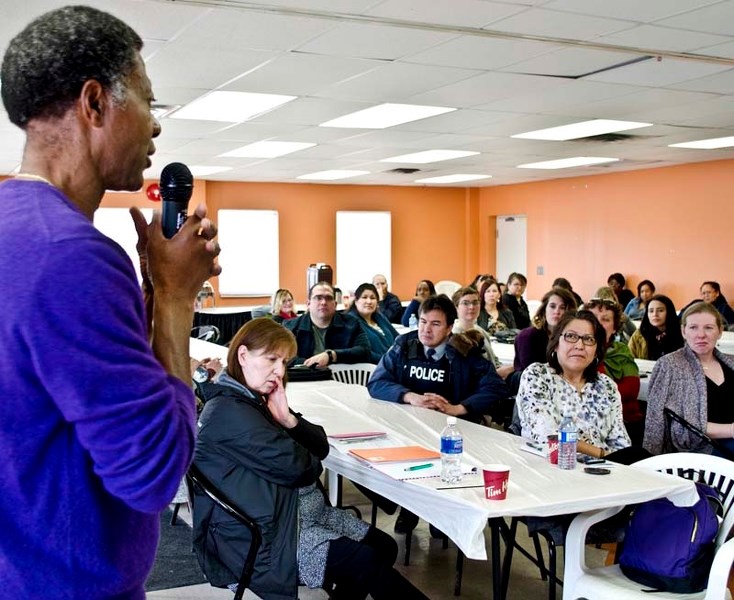A family and community resource centre will open on the Stoney Nakoda Nation later this year.
The Wesley band announced the new resource hub at a meeting on March 22, following up on a meeting in February that focused on discussing solutions to drugs and crime.
“After the last meeting, I thought, ‘Yeah I’ve heard promises before, I’ll believe it when I see it.’ But I spoke to an elder who said, ‘Don’t stop, eventually you’ll be heard,’” said Krista Hunter, Stoney Nakoda resident, who gave her blessing for the new resource centre.
Wesley CEO Hopeton Louden said the band wants to create a resource hub that is visible and accessible after administration acknowledged concerns about increasing drug use in the community.
“We have two challenges facing the Nation, one is prescription drugs and one is meth,” explained Dwayne Clayden, director of emergency services.
“There are more deaths out here than communities of similar size but that death is from all causes, natural causes, vehicle collisions, suicides, overdoses. That being said, is there too much drug use? Yes. Are there too many overdoses? Yes.”
In a Nation of 5,600 residents in three bands – Wesley, Chiniki and Bearspaw – elders and RCMP have pointed to drugs as the source of crime and other problems.
“Last time I called it a demon – it started with alcohol then there was prescription medication and marijuana and meth and cocaine. It has really taken its toll on our community,” Hunter said.
Before the meeting started, Dr. Esther Tailfeather, from the Blood reserve southwest of Lethbridge, walked around the room showing the approximately 40 community members in attendance how to use Narcan. The nasal spray is for emergency treatment of a known or suspected opioid overdose.
“What is happening in your community is happening in our community,” Tailfeather said.
“There were an alarming number of overdoses in our community. It started as one or two a week then there were three or four deaths a day … we decided to do something as a community. We couldn’t handle the death anymore.”
Tailfeather worked in the emergency room during a state of emergency declared by the Blood Tribe band in 2015. She said the band took extreme action after finding two parents dead in their home at their kitchen table with the children still in the house.
Medical professionals ordered Narcan kits, and taught residents how to administer the nasal spray, while also offering prescriptions for Suboxone – a pill used to treat opioid addiction.
“We changed the absence-based thinking to harm reduction,” Tailfeather told Stoney residents.
Tailfeather said residents need to talk openly and not shame community members addicted to drugs.
“We need to help our people find a purpose to live,” Tailfeather said.
After the presentation, an elder in attendance asked how to deal with the supply of the drugs.
Tailfeather said RCMP officers are working on finding the dealers. Band administration also needs to work with doctors to discuss prescription medication alternatives, she added.
“The dealers were banned from our reserve,” Tailfeather added.
After the speech, facilitators presented Tailfeather with gifts from the Stoney people, including a smudge pot, sweet grass and a handmade dress, before continuing the discussion.
Tailfeather’s presentation was followed by another from a Nation member who shared a story of personal loss and one of trauma.
Myrna Kootenay, Bearspaw band member and loss and grief counsellor, told a story about a family member who was murdered last January. She also discovered a youth in the community who had committed suicide.
“A lot of us in the community carry heavy hearts,” Kootenay said.
“People don’t reach out for help, they walk around with their head hanging down. We are trying to lift heads and bring comfort – I don’t want to see another young person hang themselves in their parents’ home.”
Kootenay said she and other counsellors will be offering a Grief and Loss Support Group starting in April to run for six weeks. The group will be held at the Bearspaw Youth Centre until May, when the Family and Community Resource Centre is scheduled to open.
The resource centre will operate out of the Elders’ Lodge as a “one stop hope” for programs and service delivery.
“This gives us hope for the path we are on,” Louden said.
For more information on the grief and loss support group, contact organizers at [email protected] or call Elizabeth at 403-660-5636.
FACTBOX
How to administer Narcan:
-Administer a single spray of Narcan Nasal Spray to adults or pediatric patients into one nostril
- Administer additional doses of Narcan Nasal Spray, using a new nasal spray with each dose, if the patient does not respond or responds and then relapses into respiratory depression. Additional doses of Narcan Nasal Spray may be given every two to three minutes until emergency medical assistance arrives.




